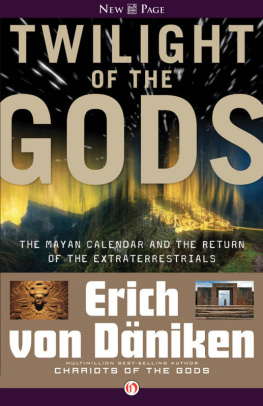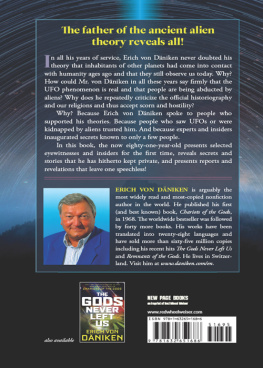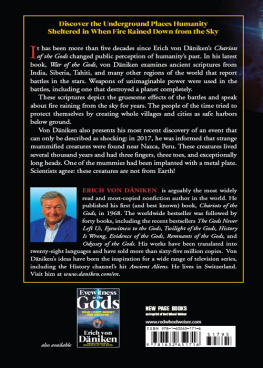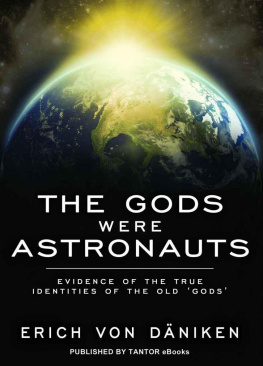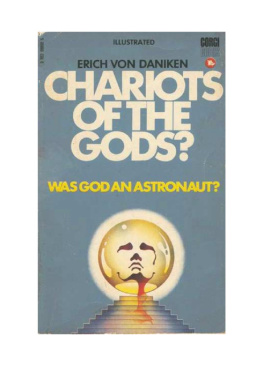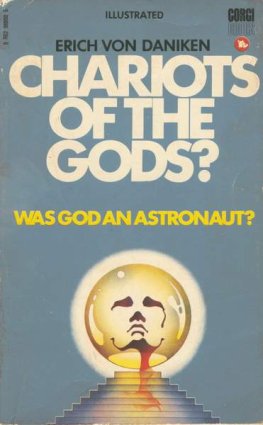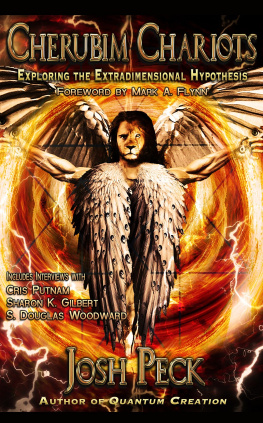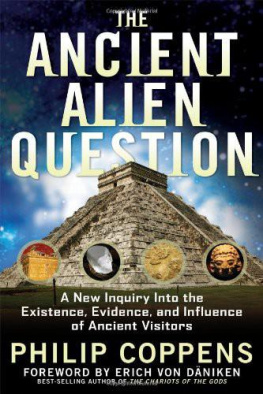THE GODS NEVER LEFT US
THE GODS NEVER LEFT US
The Long Awaited Sequel to the Worldwide Best-Seller
CHARIOTS OF THE GODS
ERICH VON DNIKEN

Copyright 2018 Erich von Dniken
All rights reserved under the Pan-American and International Copyright Conventions. This book may not be reproduced, in whole or in part, in any form or by any means electronic or mechanical, including photocopying, recording, or by any information storage and retrieval system now known or hereafter invented, without written permission from the publisher, The Career Press.
THE GODS NEVER LEFT US
Typeset by Diana Ghazzawi
Cover design by Howard Grossman/12E Design
Crop circle image by innovari/depositphotos
Meteor show background by Wutip/envato elements
Printed in the U.S.A.
To order this title, please call toll-free 1-800-CAREER-1 (NJ and Canada: 201-848-0310) to order using VISA or MasterCard, or for further information on books from Career Press.

The Career Press, Inc.
12 Parish Drive
Wayne, NJ 07470
www.careerpress.com
Library of Congress Cataloging-in-Publication Data
CIP Data Available Upon Request.
INTRODUCTION
LETTER TO MY READERS
Dear Reader,
In 1966 I wrote my first book, Chariots of the Gods. In the introduction I stated, Writing this book requires couragereading it no less so. Because its hypotheses and evidence do not fit into the laboriously constructed mosaic of established conventional wisdom, scholars will put it on the list of those books which it is advisable not to talk about. Meanwhile, 50 years have passed. My introduction from that time still stands today. The Gods Never Left Us is most definitely not a compendium of my previous works. In only very few sections do I have to cross-refer to my previous books, but only so that the reader is not left hanging.
That extraterrestrials visited Earth millennia ago and influenced our forebears can be proved. Butand this is the ultimate test of our knowledgeETs are still at work today. And that concerns us all. Why do they do what they do? What does an extraterrestrial species gain from observing us rather like we observe ants? What have the aliens actually wanted in the millennia to the present day? Cant they leave us in peace? And why do we make it so difficult for ourselves to accept the existence of extraterrestrials?
That is what this book is about. To create the right mood for the main subject, I will start with a strange short story. The following science fiction story may demonstrate how extra-terrestrials influenced humanity since their existence.
Very warmly yours,
Erich von Dniken
CHAPTER 1
THE GODS NEVER LEFT US
Apparitions dont exist! Roger Favre growled defiantly. He refused tenaciously to accept the impossible when quite obviously something strange was going on. Something was no longer quite right. Was his mind playing games with him? His eyes? The first signs of Alzheimers? Were the usual complaints beginning to affect his 70-year-old body? Roger no longer felt quite sure of himself, but was unwilling to discuss it with anybody. Perhaps a bit less alcohol? Stop smoking? Or should he do what all the know-it-alls were recommending: more exercise? And give himself a heart attack?
Roger Favre sat in the same armchair in which he had been watching television for years. It was heavy, made of dark leather, with a slight bulge to support his neck and wide armrests on both sides. Roger smoked, skimmed through the daily paper, and waited for Madelaine to call him when dinner was ready. This is what had happened every evening since his retirement and nothing seemed capable of shaking this routine until, well, until something was no longer quite right. Until these strange lights started appearing.
Among his acquaintances, Roger was seen as an even-tempered kind of person. Some called him boring, others humorless, but all valued his knowledge of his subject. Roger had worked for decades as a geometry teacher in the towns high school. In French-speaking areas, high school teachers were called professor. Monsieur le Professeur. If there were questions about measurements or volume, and that happened frequently in the city of Geneva, his former students were happy to consult him. Roger had a 46-year-old son who worked for the last 14 years as a physicist at the Conseil Europen pour la Recherche Nuclair (CERN). This son had the same first name as his father. That is why Rogers wife called him mon petit Roger. My little Roger. Roger senior had become a triple grandfather through Roger junior. The family had done well, and he should have been able to enjoy his existence as a pensioner without any worries. If only there hadnt been the fluttering and intrusive lights that materialized at irregular intervals at foot-level by his television armchair. Rogers wifes name was Madelaine, but he called her Didi, his term of endearment, because Madelaine, so he thought, made her sound like a maid and a servant. And every few years, Roger fell prey to some whim. Madelaine called it his obsessions. They came and went like the seasons or the sudden urges of pregnant woman for a particular food. On one occasion, he had planted 30 palm shoots in his garden in a fit of enthusiasm so that it would make him feel as if he were in the South Pacific. The unexpectedly freezing winter turned his South Pacific into Alaska. Another time, he held forth that every responsible paterfamilias had to ensure that he had a power generator in the house. He acquired a diesel engine and dug an illegal pit in the cellar, which he sealed with asphalt. When the power failed in the whole district, the police moved in. His tank was against the law, they yelled, and was polluting the ground water. It had to be pumped out immediately. The whole house stank of diesel for weeks. Another episode worth mentioning was the one with the tunnel. He needed an escape tunnel to save himself and his loved ones below ground in the event of a disaster, Roger asserted with a deadly serious face. He dug valiantly with crowbars, pickaxes, and shovels for 12 weeks and even employed helpers whom he remunerated generously for their silence. Then the groundwater came flooding into the cellar. Not all of a sudden, but rising day after day. Ever since then, Didi had dismissively called the cellar Loch Ness.
People thought of Roger as kind and helpful, just a bit eccentric. Sometimes. And now the business with the odd lights on the floor. Was he beginning totally to lose the plot?
For two weeks, there had been these strange goings-on. Roger had bought the daily paper at the kiosk, drank a couple of beers in the Bar du Lman, and when he got home, greeted Didi in the kitchen. Like every evening, he had thrown himself into his ancient leather armchair and waited for Didis call to dinner. As he was leafing through the paper, he was suddenly irritated by a flickering light by his left foot. It was probably some reflection from outside, and then it disappeared as quickly as it had come.
Then it reappeared. Twice. Three times. Where did the light come from? Roger went to the window, his eyes searched the street up and down for a car headlight, a reflective piece of material, children playing with flashlights, anything that had not been there on previous evenings. He registered no changes; furthermore, it was the middle of March and the sun had sunk below the horizon.


